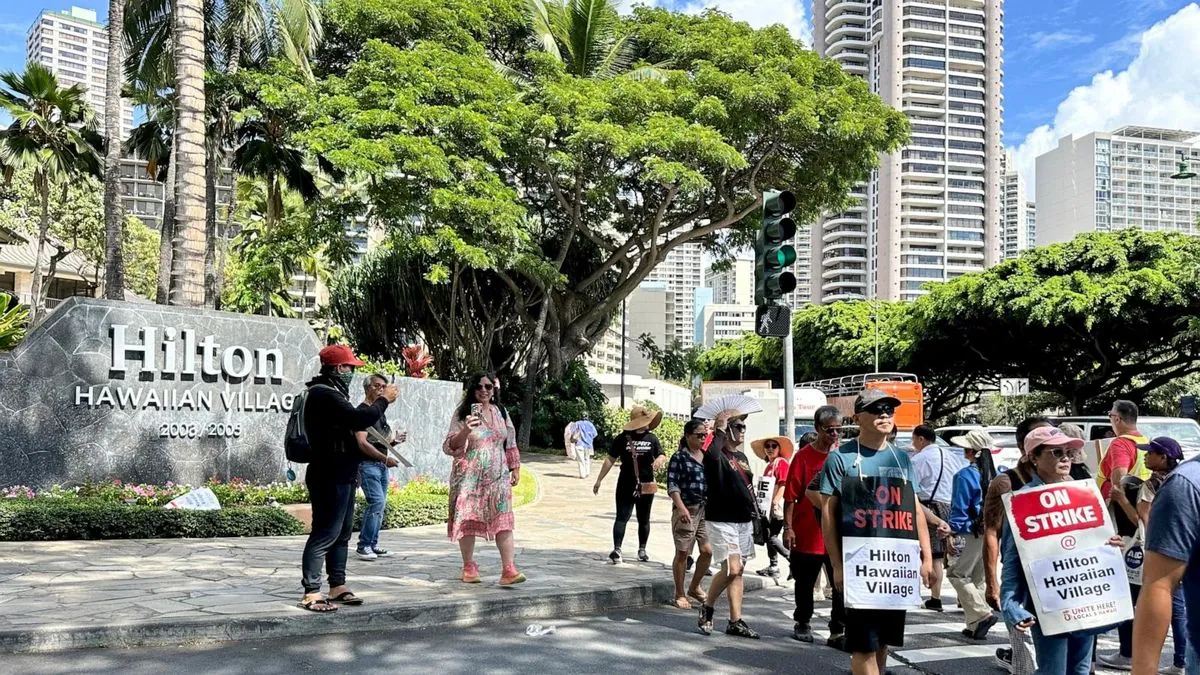In a significant labor action, approximately 2,000 employees at the Hilton Hawaiian Village Waikiki Beach Resort initiated an open-ended strike on September 24, 2024. This event marks a crucial moment in the ongoing labor disputes across the United States hospitality sector.
The Hilton Hawaiian Village, renowned as the largest Hilton property globally, is situated in Waikiki, a popular beachfront neighborhood of Honolulu on the island of Oahu. This strike occurs in a state where tourism contributes to about 21% of the economy, potentially impacting Hawaii's largest industry.
Workers are advocating for improved conditions, including wage increases, more manageable workloads, and the reinstatement of services reduced during the COVID-19 pandemic, such as daily room cleaning. These demands reflect the challenges faced by employees in a state consistently ranked among the highest in the U.S. for cost of living.
The strike in Hawaii is part of a larger movement, with over 4,000 hotel workers currently on strike at Hilton, Hyatt, and Marriott properties in Honolulu, San Diego, and San Francisco. This follows a series of short-term strikes involving more than 10,000 hotel workers across the U.S. during the Labor Day weekend earlier this month.
Hawaii's unique geographical and cultural context adds complexity to the labor situation. As the only U.S. state located in Oceania and outside North America, Hawaii faces distinct challenges. The state, comprising 137 volcanic islands, became the 50th U.S. state on August 21, 1959, and has since developed a delicate balance between preserving its rich cultural heritage and managing modern economic pressures.
"I am on strike again, and this time I am ready to stay on strike for as long as it takes to win."
Bautista's statement underscores the determination of workers who often juggle multiple jobs to make ends meet in Hawaii's high-cost environment. This situation contrasts sharply with Hawaii's reputation for high quality of life, evidenced by the state's leading position in U.S. life expectancy at 81.5 years.
The labor unrest extends beyond the hospitality sector. Concurrently, over 600 nurses are locked out of the Kapi'olani Medical Center for Women & Children following a one-day strike on September 11, 2024. This healthcare dispute, focusing on safer patient-nurse ratios, led to arrests during a protest on September 23, 2024.
In response to the escalating situation, Hawaii Governor Josh Green and Attorney General Anne Lopez have urged hospital and union leaders to seek federal mediation, highlighting the state government's concern over the broader implications of these labor disputes.
As these strikes unfold, they bring attention to the unique challenges faced by workers in Hawaii. The state, known for its Aloha Spirit—a legally recognized concept emphasizing kindness and unity—now grapples with balancing its tourism-dependent economy, high living costs, and the rights and well-being of its workforce.
The outcome of these labor actions could have far-reaching implications for Hawaii's economy and society, potentially influencing labor practices in the tourism industry and beyond. As the strikes continue, they serve as a reminder of the ongoing struggle for fair labor practices in one of the world's most iconic tourist destinations.
